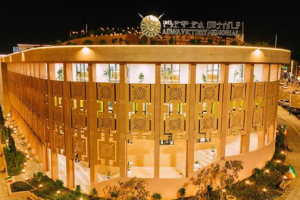
BY ALAZAR SHIFERAW
In 2019 Ethiopia has managed to get ’Timket’( Ethiopian Epiphany) inscribed on the Representative List of the Intangible Cultural Heritage of Humanity. The fourth intangible heritages of the country ‘Timket’ is one of them. Yes, most tangible and intangible cultural, natural and historical heritages have been registered by United Nation Educational Scientific and Cultural Organization (UNESCO).
Proudly, ‘Epiphany’ is observed by Christians globally, but here, Ethiopian epiphany is celebrated outdoor with colorful processions to commemorate the baptism of Jesus Christ by John the Baptist in the River Jordan. Exceptionally, the ceremony begins on the eve on 18 January in Ethiopia.
It is recognized as ‘Ketera,’ which means blocking water for the blessing of the congregations.On ‘Ketera,’ people accompany their respective village’s church ‘Tabot’(replica of the arc of the covenant) to Timkete-Bahir. Priests carry the ‘ Tabots ‘ accompanied by mass celebrants. Yes, hundred thousands of people participate in the main festival day 19 January.
The festivity starts early in the morning with rituals. Following the sprinkling of the blessed water on the congregants, preaching, religious songs as well as other ceremonies, at about 11 a.m, each ‘Tabot ’ begins its march back to its respective church, with more colorful ceremonies accentuated by various traditional dances. .
However, having such a magnificent ceremonial culture, financially Ethiopia is not getting much benefits from this religious ceremonial heritage. Besides, this year, due to the coronavirus pandemic, tourists’ influx has also decreased due to the COVID-19 and recent unrest in some corners of the country.
Much work remains to be done to reverse the current condition. Similar to global countries, Ethiopia has been affected by the decline of tourists flow . But Ethiopians have to take pride from these distinct cultural and religious ceremonial parades.
Apart from many intangible wonders the country possesses, there are several magnificent tourist attraction sites that have huge potential for tourist destination and which can assist nation’ poverty reduction and job creation opportunities.
In this regard, the country should exert maximum efforts to promote its delightful heritages well. Citizens should develop and keep their cultural values and respect their respective cultures. In addition to cultural values and economic benefits, heritages can promote Ethiopians’ identity and allow to prevent cultural invasions too.
Above all, peoples’ ceremonial passion is impressing. Old and young, females and males wear their respective cultural outfits. They reflect Ethiopian sentiment and help keep intact native cultures. But, compared to its potential it is not promoted well to generate much income.
Yes, ‘Timket’ is a showcase of Ethiopians’ love and respect for one other. In short, it is Ethiopian cultural and religious festivity and identity. Mainly, “Timket’ for Ethiopian orthodox is a memorial of the revelation of the secret of Jesus Christ.
Anibal Bono a foreign tourist. He came from Spain and said “I am very much pleased indeed. I come here to celebrate ‘Timket ‘. It is amazing. There are lot of very colorful crowds. And lot singings and dancing. I like it very much. I came to Ethiopia twelve years back,” But it was his first time participating in the Timket ceremony.
Thousands and thousands of people wear traditional colorful cloths. There are lots of elements that make the celebration very special. ‘Timket’ can play a great role in boosting the smokeless industry of the country, he said.
But, to preserve all the traditional part of the celebration, there is a need for more promotional activities. “When I return to my country, I will tell my friends to come to Ethiopia. I will take pictures and make videos to post them on internet.”
The inherited cultural heritage should be passed down to the next generation intact. Religious lessons must be provided in a strengthened manner. Because, intangible heritages are showcases of the country’s cultures. Indeed, economically, the government and tourist-related-service providers are the major beneficiaries. But they should work jointly.
The growth of Tourism is often measured by the increase of international arrivals, duration of stay, availability of quality lodgings and expenditures. Festivals and special events are the most important opportunities to achieve the identified goals of tourism. Thus, ‘ Timket festival has contributed for the development of tourism in Ethiopia .
The image building value of the festival has helped the country in raising tourist influx profile so that tourists’ interest to spend more time in the country.
In addition, the celebration stuns tourists satisfying their expectation of Ethiopia that boasts a lively culture. The tourist influx was very high but due to the pandemic it has tumbled down. Apart from the domestic tourists, many tourists come from various parts of the world.
Many come from Europe , America, Africa and Asia, therefore ‘Timket’ is helping the economy as one of tourist attraction intangible cultural heritages to Ethiopia .
Believers pray together, sing and perform the festivity together which is important as a means of strengthening social solidarity. ’ Timket’ is helping to sustain significant common values and preserving the value of the community.
The United Nations Development Program (UNDP) said that projects ensure respect for the dynamic and living nature of intangible Cultural Heritages and the right of communities, groups and, where applicable, individuals to continue the practices, representations, expressions, knowledge and skills necessary to ensure the viability of their intangible Cultural Heritages.
Where projects may involve or affect intangible Cultural Heritages, they will ensure the meaningful participation of concerned parties in identifying risks and impacts to their intangible Cultural Heritages—including its decontextualization, commodification and misrepresentation—and in determining appropriate mitigation and safeguarding measures.
This includes the identification, inventorying, documentation, research, presrvation, protection, promotion, enhancement, transmission, and revitalization of the various aspects of such heritage stakeholders, shortage of hotel accommodation, price and signage problems are among the formidable ones.
Moreover, recent Science Direct Publication said that the tourism industry was one of the world’s greatest markets; until the world faced a pandemic threat in the 21st century. The tourism sector was easily affected by the global crises. It was almost the same day that travelers decided to cancel or delay their trips, with the spread of the news. Globally, much benefits from travellers have been canceled and refunded due to the travel’s cancellations.
Travel insurance has become a hot topic, which may be a way of reviving the industry by offering travel packages, including travel insurance services, it said.
The Ethiopian Herald January 24/2021





